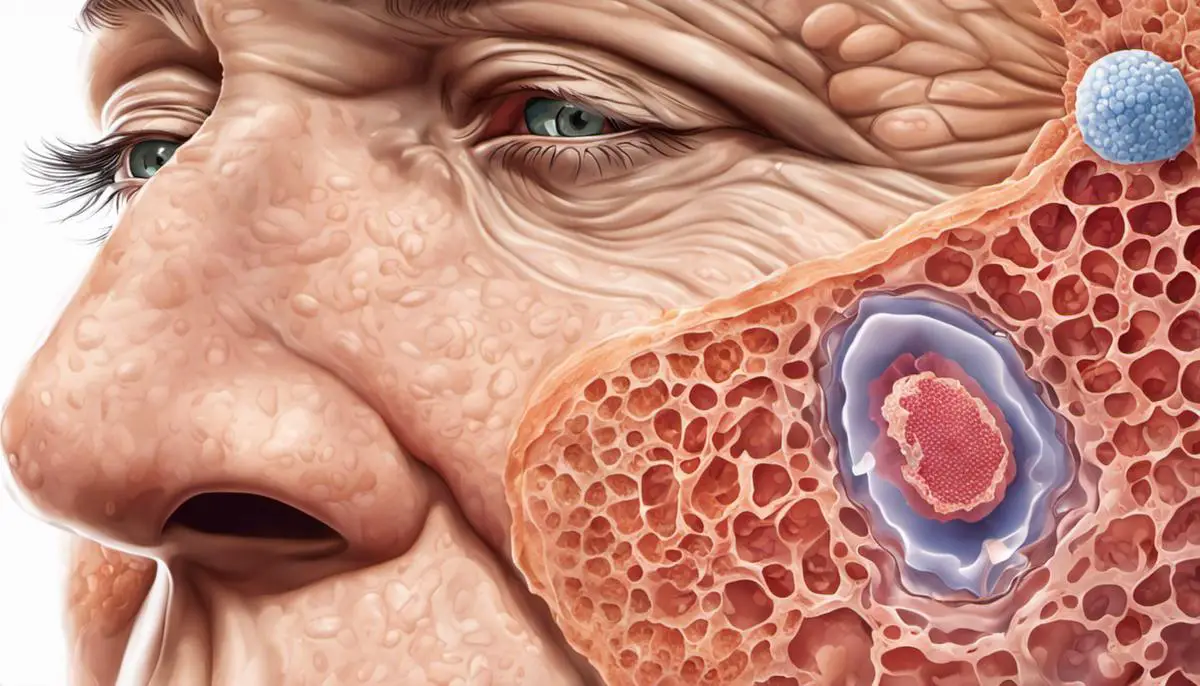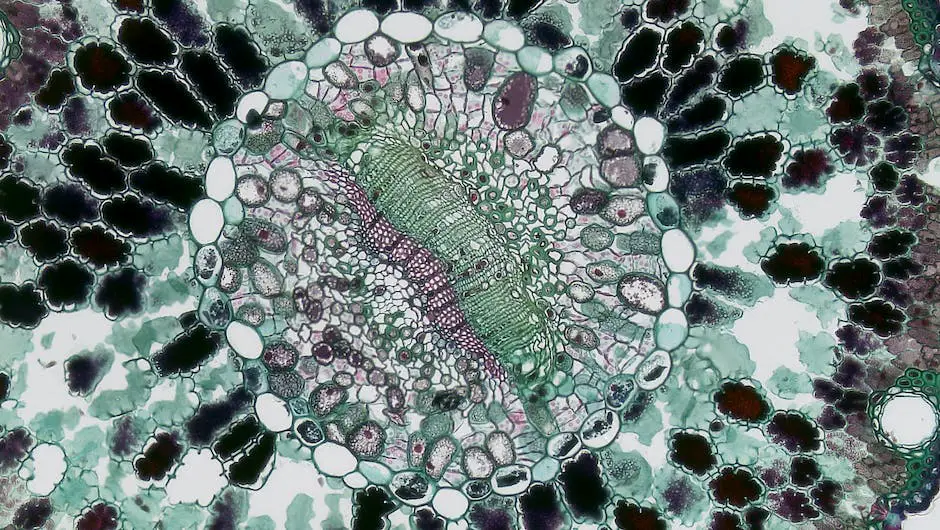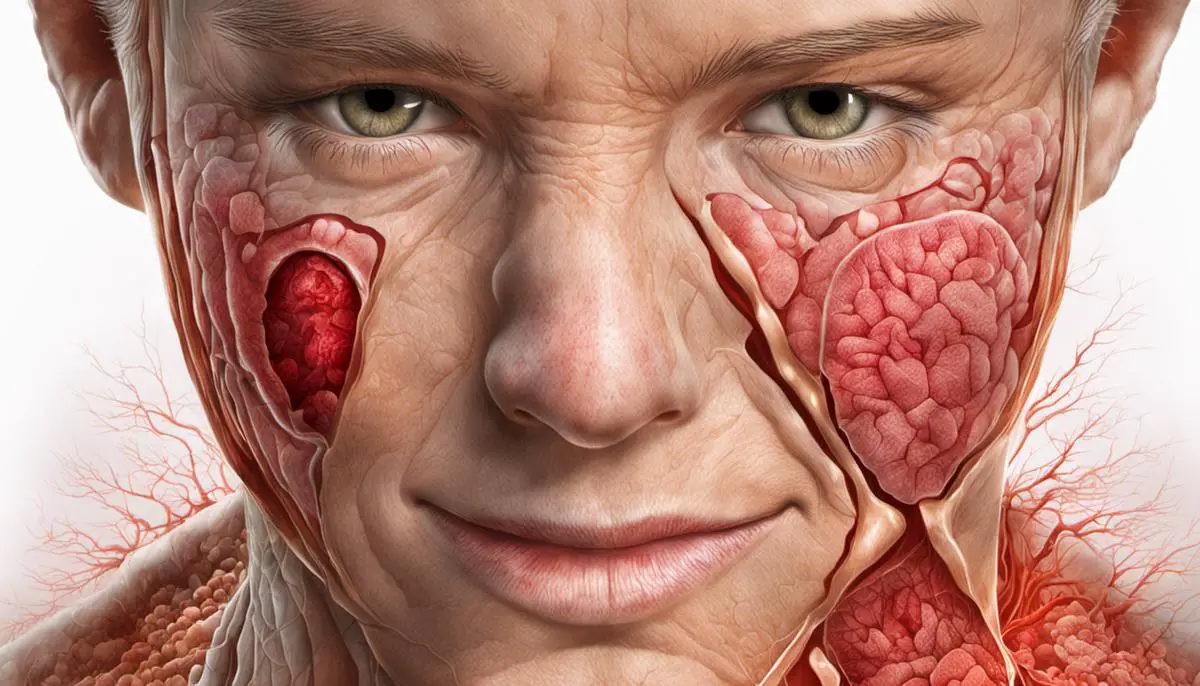Basal cell carcinoma (BCC), a form of skin cancer commencing in the basal cells, is a significant health concern that often presents itself in multiple forms including open sores, red patches or unusual growths. With an array of causes and myriad of symptoms, this type of skin cancer has the potential to escalate, especially when left untreated. The sequelae of untreated BCC extend beyond mere physical health complications like disfigurements and potential infections; it also encompasses a wide range of psychosocial outcomes. Dealing with a progressing skin disease can precipitate a myriad of psychological reactions, such as anxiety, depression and social isolation.
Understanding Basal Cell Carcinoma
Understanding Basal Cell Carcinoma
Basal cell carcinoma (BCC) is the most common type of skin cancer in the world. It originates in the basal cells, which are in the outermost layer of the skin. These cells produce new skin cells as old ones die off. Alterations in cell DNA cause basal cells to grow and multiply rapidly, leading to the creation of cancer cells that form a tumor on the skin.
BCCs are typically caused by prolonged exposure to ultraviolet (UV) radiation from the sun or indoor tanning. People with fair skin, a history of skin cancer, multiple moles, and a family history of skin cancer are at a heightened risk of developing BCC. The cancer generally appears as a waxy bump or a flat, scaly, brown or flesh-colored patch on the sun-exposed areas of your body.
Ignoring BCC: Health Consequences
Delaying or eschewing treatment for basal cell carcinoma can lead to a series of severe implications. Untreated, it poses the threat of local destruction and disfigurement, as BCCs can invade surrounding tissues and structures, the likes of muscles, nerves and bones. This can result in facial disfigurement or nerve damage depending on the location of the carcinoma.
BCC – A Potential Metastatic Threat
While BCCs are generally slow-growing and rarely spread to other parts of the body, it’s crucial to remember that it’s not impossible. Neglected for a long time, BCCs can advance into metastatic basal cell carcinoma (MBCC). Though MBCC is exceedingly rare, comprising less than 1% of all BCC cases, once it occurs it can be life-threatening. Metastasis typically implies that the cancer has spread to the lymph nodes or other parts of the body, including vital organs like the lungs.
Mental Health Impact of Ignored BCC
Physical consequences aside, untreated BCC can also have psychological impacts. Living with any form of cancer can contribute to significant emotional distress. Fear and anxiety regarding the progression of the disease, body image disturbances due to skin disfigurement, and the overall strain of living with a chronic condition can contribute to mental health conditions such as depression and anxiety disorders.
Skin health requires vigilance, especially when it comes to Basal Cell Carcinoma (BCC)—a common type of skin cancer in the United States. Early detection and treatment of BCC can prevent serious health complications. Regular skin check-ups are paramount, particularly for those at high risk, as these can lead to timely intervention and mitigate potential damage from the disease.

Progression of Untreated Basal Cell Carcinoma
Delving Deeper into Basal Cell Carcinoma (BCC)
At its core, BCC is a form of skin cancer that originates in the basal cells, which are responsible for the production of new cells as older cells die off. It’s typically caused by long-lasting exposure to sunlight or from using tanning beds. BCC often manifests as pink or red bumps, shiny patches, or open sores. Hence, if you notice any unusual skin changes, it’s essential to seek a healthcare provider’s evaluation immediately.
Progression of Untreated Basal Cell Carcinoma
When left untreated, basal cell carcinoma can gradually become more serious. Early-stage BCC is localized, primarily affecting the epidermis and the top layer of the dermis. But as it progresses, it begins to penetrate deeper into the dermal layer and can spread to surrounding tissues. While BCC is slow-growing compared to other cancers, it’s invasive and can cause extensive tissue damage due to its propensity to invade fat, muscle, nerves, cartilage, and bone.
The expanded growth can lead to non-healing ulcers, also known as Rodent Ulcers because of the “gnawed away” look they can cause on the skin’s surface. These wounds can become infected, leading to further complications.
Rare Metastasis of Untreated BCC
Although basal cell carcinoma rarely metastasizes (spreads to other parts of the body), it can happen if the carcinoma is left untreated for a long period. According to the Skin Cancer Foundation, less than 0.5% of BCC cases metastasize. When BCC does metastasize, it usually spreads to lymph nodes first, then possibly to the lungs, liver, bones, or other organs, making treatment more challenging.
General Health Implications
Aside from skin damage and the potential for metastasis, untreated BCC also increases the overall risk of acquiring additional skin cancers. This risk is heightened for individuals with a history of BCC, recurrent BCC, or multiple BCCs.
Untreated BCC can also create psychological distress. Living with visible skin damage, particularly facial lesions, can lead to depression, anxiety, and social isolation due to altered physical appearance and the fear of social stigma, significantly impacting quality of life.
Emphasizing the Importance of Treatment
With its slow growth, BCC may seem harmless at first, but it is absolutely crucial not to postpone treatment upon discovery. A speedy diagnosis and treatment can lead to a full recovery, without the severe health implications that may emerge if unchecked. A host of treatment options is available, including tumor surgery, topical applications, radiation treatment and even specialized oral medications for advanced cases of BCC. Regular skin inspections, protective measures against the sun, as well as immediate response to any skin discoloration or abnormalities, are all vital preventative measures against BCC or towards its successful treatment.

Impact on Physical Health
Unveiling Basal Cell Carcinoma
Basal Cell Carcinoma, often referred to as BCC, is a variant of skin cancer that commonly materializes on the skin as glossy bumps or stubborn sores that fail to heal, particularly appearing on the face, ears or neck. This kind of cancer originates from mutations in the DNA of basal cells located in your skin. These cells are traditionally tasked with the production of new cell replacements as older ones die off, causing significant disruption and abnormalities when mutated.
Implications of Not Treating BCC on Physical Health
Ignoring BCC can have severe health consequences. One of the most immediate and noticeable impacts is disfigurement. Without treatment, the cancer can expand causing significant damage to the skin and underlying tissues. This can lead to visible scars or changes in the texture of the skin.
Functional Impairment
The location of BCC can also be problematic, particularly when it appears on the face. If left untreated near or on the eye, it can lead to visual impairments. If it’s on the ear, it can cause hearing complications. BCC growing on the nose or near the mouth can interfere with breathing or eating.
Risk of Infections and Necrosis
There is also a risk of developing severe infections. Open, non-healing wounds which are characteristic of BCC can become breeding grounds for bacteria. This can lead to localized skin infections or, in serious cases, more systemic infections that can spread to other parts of the body.
In addition, necrosis, or tissue death, can occur if BCC is left untreated. Necrosis generally happens when the cancer cells grow in a way that obstructs blood flow to areas of the skin, causing that skin tissue to die.
Potential Progression and Metastasis of BCC
While BCC is typically slow-growing and rarely spreads to other parts of the body (a process known as metastasis), there are exceptions. In rare cases, if undiagnosed or untreated, BCC can metastasize and spread to other organs, including bones and the brain. Once this happens, the cancer can be much more difficult to treat and can be life-threatening.
Untreated Basal Cell Carcinoma (BCC) can have serious impacts on an individual’s physical health. These complications may range from severe disfigurement and loss of functionality to critical infection, tissue death, and, even though less common, life-threatening metastasis. One simple but highly effective measure to aid early detection and treatment of this type of skin cancer is regular self-examination of the skin coupled with prompt medical attention to any identified abnormalities.

Psychosocial Implications of Untreated BCC
Understanding Basal Cell Carcinoma (BCC)
BCC is the most frequent form of skin cancer found today. It is generally believed to be triggered by occasional intense sun exposure or severe sunburns. You may identify BCC as a small, shiny, and raised area or patch on your skin, highly likely to be in high sun-exposure zones such as your head, neck, and arms. Negligence in treating BCC can result in the cancerous cell growing deeper, thereby leading to extensive damage to surrounding skin tissues.
Physical Impact of Untreated BCC
In its early stages, BCC might not cause a lot of physical discomfort. Over time, however, as the disease progresses, it can lead to skin disfigurement and functional impairment. Late-stage BCC can be particularly invasive, causing significant tissue damage and disfigurement if the disease reaches an advanced stage without treatment.
Psychosocial Consequences of Untreated BCC
The physical changes associated with untreated BCC often have profound psychosocial consequences. The most directly affected area is body image. Disfigurement and the distinct appearance of lesions can lead to a decline in self-esteem and feelings of self-consciousness.
Anxiety is a common response to any form of illness, particularly in cases of untreated or advanced illness. The uncertainty of the progression of BCC can cause significant distress, especially when conditions worsen with lack of treatment. This distress can manifest as anxiety.
Depression, too, is a potential consequence of untreated BCC. The constant feeling of discomfort, coupled with a decline in physical appearance can lead to feelings of sadness and a decrease in overall mood.
Untreated BCC also has significant implications for individuals’ social lives. Fear of judgment from their physical appearance may result in social withdrawal and isolation. This isolation can be especially detrimental, as social support is a critical component for general well-being.
Furthermore, these conditions – anxiety, depression, and social isolation – can become cyclical. Untreated physical conditions can exacerbate psychological issues, which in turn can delay seeking treatment, leading to worse physical conditions.
Understanding the Consequences of Delayed Treatment
Delaying or avoiding treatment for Basal Cell Carcinoma (BCC), a common type of skin cancer, may not only escalate your physical symptoms but also have significant psychological ramifications. It is imperative to seek timely treatment for BCC to curb physical deteriorations and cope with psychological impacts. Timely detection and management of BCC significantly diminish the risk of severe facial distortions and the resultant psychological distress.

Importance of Early Detection and Treatment
The Significance of Prompt Diagnosis
Basal Cell Carcinoma (BCC) primarily develops in the deepest skin layer’s basal cells. While it’s typically not fatal, neglecting or postponing treatment could lead to serious consequences. Prompt diagnosis and intervention in the early stages are therefore critically important in managing the disease and preventing more severe complications.
Physical Implications of Untreated BCC
Untreated BCC can lead to severe skin damage and disfigurement. The cancerous cells can grow to invade and damage surrounding healthy tissue. The lesions may become larger and more in-depth, possible to such an extent that they affect the muscle and bone underneath. This can lead to significant facial disfigurement, particularly if the BCC is located on the face. If left untreated, the BCC can result in the loss of an eye or ear.
Medical Complications
Even though BCC rarely spreads to other parts of the body, untreated cases may see the disease invading deeper tissues such as nerves and bones, causing further damage. If a BCC develops on a high-risk area, such as the nose, ears, or near the eyes, the cancer can grow into the cranial nerves, possibly leading to neurological damage.
Treatment Options for BCC
Once diagnosed with BCC, several treatment options are available depending on the size, location, and subtype of BCC. These options include surgical excision, cryotherapy, photodynamic therapy, topical treatments, and Mohs surgery – a tissue-sparing technique that is especially useful in high-risk areas. The success rate of these treatments is high when BCC is detected early.
Importance of Timely Treatment
Prompt detection and treatment not only prevent invasive growth and disfigurement but also significantly reduce the chances of recurrence. Furthermore, it can avoid the need for more extensive and often invasive treatments if the cancer were allowed to progress. Regular check-ups and self-examination for early signs are recommended to facilitate early detection and treatment.
Untreated BCC and Quality of Life
Aside from physical and medical complications, untreated BCC may also significantly impact quality of life. People may experience anxiety and stress from the knowledge they have an untreated form of cancer. Moreover, untreated, visible skin lesions can lead to body image issues and social stigma, negatively impacting mental health and everyday life.
It’s essential to understand that while BCC is usually slow-growing and non-metastasizing, ignoring or delaying treatment can lead to severe complications. Early detection and treatment are, therefore, of the utmost importance to effectively manage and cure BCC. Awareness and education about skin cancer, its risk factors, and early signs can prevent severe outcomes associated with untreated BCC.

The significance of early detection and timely intervention when dealing with Basal Cell Carcinoma cannot be overstated. Advancements in medical sciences have resulted in successful treatment modalities that can curtail the progression of this disease. Overcoming BCC goes beyond merely eradicating the physical symptoms, as it subsequently aids in mitigating the associated psychosocial effects. Consequently, understanding BCC, its progression if left untreated, its impacts on both physical and mental health, and the available treatment options becomes pivotal. Remember, recognition of early signs and prompt action can make a world of difference.
